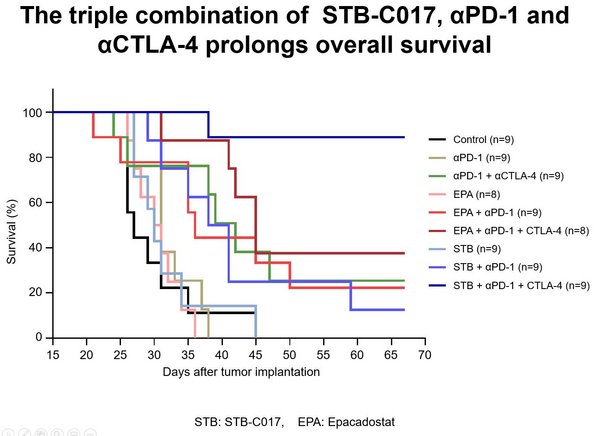- STB-C017 is an IDO/TDO dual inhibitor, derived from Syntekabio’s proprietary drug discovery artificial intelligence solution, demonstrated powerful immuno-oncologic effect.
- Triple combination therapy of STB-C017, PD-1, CTLA-4 immune checkpoint inhibitors (ICIs) presented complete remission (CR) of tumor and long-term survival benefit.
- Subsequent nonclinical development and collaborative efforts might yield IND submission within 2 years
DAEJEON, South Korea, May 15, 2020 /PRNewswire/ — Syntekabio (KOSDAQ: 226330), an AI and NGS based drug development company, presented the result of STB-C017 animal experiments, a small molecule IDO/TDO dual inhibitor derived by Syntekabio’s AI drug discovery solution, at the 2020 American Association for Cancer Research (AACR) Annual Meeting, today at 00:00 EDT.
Chan Kim, M.D., Ph.D., associate professor of CHA Bundang Medical Center and the presenter of the research, stated, “STB-C017 significantly enhanced immuno-oncologic effect compared to epacadostat. It also derived multiple CRs when combined with ICIs.” Hong Jae Chon, M.D., Ph.D., the principal investigator, said, “Specifically in renal cell carcinoma, hepatocellular carcinoma, anti-PD-1/CTLA-4 combination is becoming standard-of-care, so combining STB-C017 on top of those combination could yield impressive treatment enhancement.”
“The result showed significant feasibility of subsequent development for STB-C017. When STB-C017 reaches market, those ICIs would be used more broadly, which would give us the opportunity,” said Sunil Youn, M.D., Business Development Director of Syntekabio.
The presentation with key findings is titled “Artificial intelligence with a deep learning technology enables a rational development of a potent immunotherapeutic agent,” and includes:
- STB-C017 effectively blocked kynurenine secretion from tumor, an immunosuppressor, and showed dose-response relationship in colorectal cancer mice models.
- STB-C017 treatment showed significant infiltrations of CD8+ T cells into the tumor, and reduction of Treg Cells.
- STB-C017 dosing regimen optimized as 5 days of administration & 2 days off
- Combination therapy with anti-PD1/CTLA4 markedly delayed tumor growth and induced multiple CRs.
– STB-C017 triple combination induced two-fold increase of CRs compared to epacadostat triple. Recovered mice acquired long-term antineoplastic immunity.
– Mice treated with STB-C017 triple combination showed marked survival benefit compared to the others, including epacadostat triple.
Syntekabio plans subsequent STB-C017 development, including GLP toxicology and animal PKPD, targeting IND submission, around 1H 2022. The company will execute further translational research based on firm collaboration with CHA Bundang Hospital and lead the full scope of the development programs.
About Syntekabio, Inc.
Syntekabio is an AI and NGS based drug development company, utilizing genomic database and artificial intelligence to predict and identify new molecular entities to be a relevant new drug product. It is the global first AI drug development company listed on the public market (KOSDAQ: 226330) last December. The Company’s lead product candidate, STB-C017, an IDO/TDO dual inhibitor for the treatment of advanced solid tumor, is under nonclinical development. The company’s subsequent pipelines include personalized neoantigen cancer vaccines, small molecules targeting established oncology targets, and biomarkers to stratify relevant patients to maximize treatment efficacy. Syntekabio’s business model is to collaborate with various academic institutions and biopharma companies to optimize development process, utilizing proprietary AI and NGS data. The Company is headquartered in Daejeon, Rep. of Korea, with offices in Seoul, Rep. of Korea and Rockville, MD, USA. For additional information, please visit webpage: http://www.syntekabio.com/
About DeepMatcherTM
DeepMatcherTM is Based on Syntekabio’s proprietary artificial intelligence platform for small molecule drug candidate discovery. The solution is a 3-dimensional structure-based deep leaning model that searches for most optimal compound structures that exhibits high binding affinity. Structural flexibility of protein-compound complex is considered to enhance predictive power, and secondary and off-target analysis is also conducted.
Photo – https://photos.prnasia.com/prnh/20200513/2801414-1?lang=0
Source: Syntekabio, Inc.


